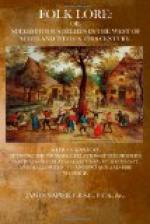When we read that epidemics which broke out in the times of our forefathers, were ascribed to such absurd causes as the introduction of forks, or because the nation neglected to prosecute with sufficient vigour alleged cases of compact with the devil, we wonder at and pity their ignorance, and rejoice that we live in a more enlightened age. But the fact is, that among the mass of the people there is really no great difference between the present and the past. There is a close family likeness in this matter of superstition between now and long ago, and this state of matters will continue so long as a knowledge of physical science—that science which treats of the laws by which God is pleased to overrule and direct material things—is not made a religious duty. There are physical sins and there are moral sins, and the punishment for the first is apparently even more direct than for the second, for in the case of physical sins we are punished without mercy. Through neglect of these laws, we are continually suffering punishment, shortening and making miserable our own lives and the lives of those dependent upon us; and periodically judgments descend on the careless community, in the form of severe epidemics. Any religion which advocates practices, or teaches doctrines inconsistent with our physical, intellectual, or moral well-being, cannot be from God, and vice versa; and this is a strong argument in favour of Christianity as taught by its Founder. I wish I could say the same of the Christianity taught by our ecclesiastics, either Protestant or Catholic.
The introduction into the heathen world of the fundamental truths that there is but one God, omnipotent and omniscient, who overrules every event, that He has revealed Himself through His Son as a God of love and mercy, and that man’s duty to Him is obedience to His laws, was a mighty step in advance of the gross conceptions of idolatry formerly prevalent among these nations. But neither heathens nor Christians had for a long time any clear idea that the overruling of God in Providence was according to fixed laws. Being ignorant on this point, they ascribed to unseen supernatural agency, working in a capricious fashion, all phenomena which appeared to differ from, or disturb the ordinary course of events. Upon such matters heathen and Christian ideas commingled, and thus heathen ideas and practices were incorporated with Christian ideas and practices. Then, when ecclesiastical councils met to determine truth, and formulate their creeds, these combined heathen and Christian ideas being accepted by them, became dogmas of the Church, and henceforth those who differed from the dogmatic creed of the Church, or advocated views in advance of these confessions, were regarded as enemies of truth. Naturally, as the Church became powerful she became more repressive, and opposed all enquiry which appeared to lead to conclusions different from those already promulgated by her, and




